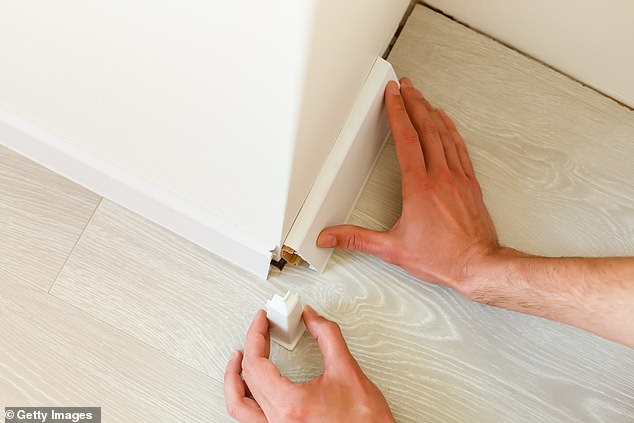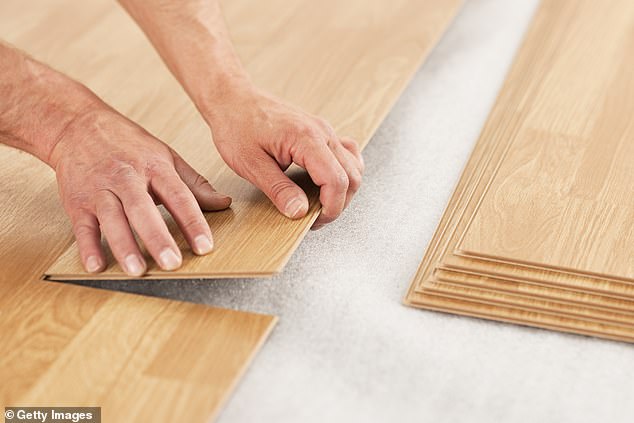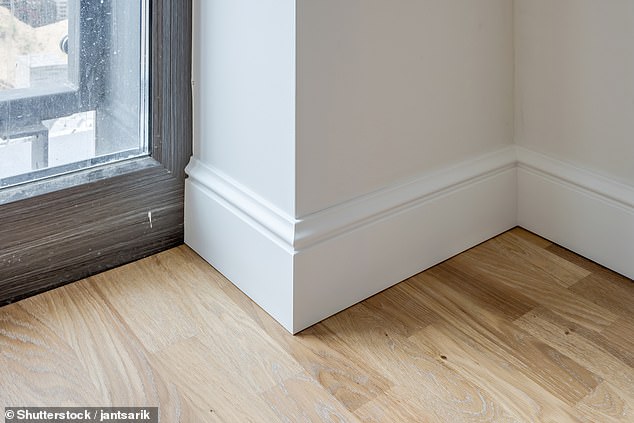I would like to get some new laminate flooring to replace my old carpet.
I’ve been having a look at the edging options as I live in a new build with paper thin walls that would not survive replacing the skirting boards.
I don’t like the traditional edging – called scotia – what are my other options?

To an untrained eye, the edging on laminate flooring may not seem important, but it is often these finer details that result in the overall look
MailOnline Property expert Myra Butterworth replies: To the untrained eye, the edging on laminate flooring may not seem important. But it is often these finer details that influence rhe overall look and feel of a room.
Having spent money on a new flooring, it is understandable that you don’t want to fall at the last hurdle and end up with a design that you were never after due to a bad fitting job.
Thankfully, laminate flooring and its furnishings have come a long way in just the past few years.
There are wood and wood-effect floorings that can suit different budgets. Solid wood tends to be the most expensive, engineered wood sits in the middle, and laminate flooring is usually the most budget-friendly.
The improvements in laminates means they can often have just as good a look as their solid or engineered wood alternatives – particularly if they are fitted well.
That includes making sure that the edging looks neat.
If flooring is laid before skirting boards are put on, they can cover any cuts and gaps at the side. If you cannot do this, then scotia is a decorative fixing where the floor meets the skirting boards, as shown in the picture below.

The picture above shows the laminate flooring, then scotia where it meets the skirting board. Most good laminate floors can be chosen with a slim scotia matched to the wood design
For those who are on a budget and may not want to go to the expensive of removing skirting boards, using scotia is a good way of covering up the expansion gaps.
Alternatively, if you’re paying for more expensive engineered wood, you may want to pay extra to get skirting refitted or for the product to sail underneath your skirting boards.
You may, of course, be fitting the new flooring yourself or hiring a trade professional to do the work for you. An professional fitter will help you work out the best option, if you are doing it yourself it is worth asking your flooring supplier about the options.
We speak to some experts about the various options that are now available, including DIY master and the first ever winner of Big Brother Craig Phillips, along with laminate, wood and luxury vinyl flooring specialists Quick-Step.

DIY master Craig Phillips gives his advice about joining laminate flooring and skirting boards
DIY master Craig Phillips, who was the first ever winner of Big Brother, replies: There are a number of options for beading around the edges.
One option is to first remove the old skirting boards – not forgetting that all flooring will need a small expansion gap from the finished edge of flooring to the wall.
The new skirting can be reinstalled over the new flooring, bridging the expansion gap.
If you don’t want to remove the skirting boards, then you would still need to leave an expansion gap that would need covering, which is normally covered using a scotia. The scotia should be fixed to the skirting, not the flooring.
If you don’t want to use a scotia bead, then there is an option to trim the skirting below and slide the flooring under this. This would be a harder and slower way to install your flooring and I wouldn’t recommend attempting this method unless you are competent at DIY or trade professional.

Laminate flooring and the type of edging used have improved in recent years
Lee Thompson, of flooring company Quick-Step, replies: A few years ago, your options would have been pretty limited. You would have either had to take off the old skirting and re-fit or use a generic scotia that might not be quite the same colour as your floor.
Thankfully, there are a few more options today so you should be able to find something that works and that keeps your skirtings in place and walls free of damage.
But don’t rule out scotia quite so readily. You’ll find that most good laminate floors can be chosen with a slim scotia that’s matched to the wood design.
It’s not just a close colour either, the wood pattern is exactly the same and it can be the smartest way to finish your laminate floor if you can’t replace the skirtings.
If you really don’t want scotia, then you may want to consider something like a multi-purpose profile. These don’t protrude from the floor quite as much, and so deliver a subtle look. However, not every laminate floor has these available, particularly in a matched pattern, so you may be limited to certain brands.

If you don’t like scotia edging, one option is to slip the laminate under the skirting boards to cover any expansion gaps
If you’re an experienced DIYer and you planning on installing the floor yourself then you might consider undercutting the skirtings.
Depending on how close the bottom of your door is to the carpet you may have to trim it to get your new laminate floor to fit, so why not also do the same on the skirting? You can then just slide the floor under. Of course, if you’re getting your floor professionally installed, then they should suggest this as an option if it’s possible.
I’m not sure what sort of skirtings your home has, but you can also find skirting covers. These can be height adjustable, and most laminate floor companies should offer these.
They are fixed onto the front of your skirting and in a white paintable finish they look impressively smart. Plus, if you’re also painting, get that done before you fix them and you won’t have to bother being too fussy about cutting in as they’ll cover any small mistakes.

Another option offered by most laminate companies is skirting covers, which can be height adjustable





